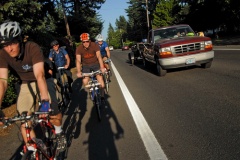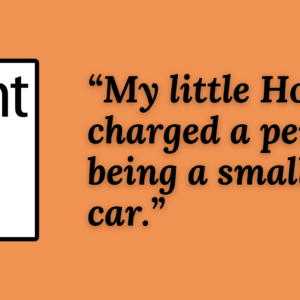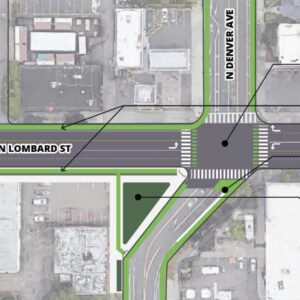
Newly elected Oregon State Representative from Southeast Portland, Jules Bailey, has introduced a bill into the legislature that would create a new vehicle weight class for non-motorized vehicles weighing under 50 pounds — such as bicycles (we think that weight might be too low with some of today’s new cargo bikes, but this is a matter that can likely change as the bill moves forward).
If the bill passes, it would create the new weight class and instruct state and local law enforcement agencies to index their traffic violation fines to match the weight class of the offending vehicle.
I spoke with Representative Bailey last week, and he explained his reasoning behind the bill. “It’s your basic physics equation,” he said. “Force equals mass times velocity, squared.”

trucks are the same.
“We currently regulate vehicles based on velocity,” Bailey explained, “but not mass. You can do a lot more damage the faster you’re going, and the fines reflect that. But heavier vehicles do much more damage than lighter ones. The fine in Oregon for rolling through a stop sign — no matter how slowly — is $242 for a bicycle or a heavy truck. This law would change that.”
Bailey said that if the Idaho stop law bill doesn’t pass, but this bill does, It would still be illegal to roll through a stop sign, but the fines would go up or down based on weight class. This would lead to lower fines for bicycles, and much higher fines for a large vehicle like an SUV or truck. “It’s based on real damage.”
Representative Bailey’s chief of staff, Meredith Shield, told me the bill — which the office is informally calling the “Fines and Weights Bill” — has not yet come back from legislative counsel, where it is being drafted into final bill form.
Shield said they expect to receive the bill back by early next week, and that it should be up before the legislature in March or April, when there will be a hearing and a chance for public testimony.
At the last Bicycle Advisory Committee meeting, Karl Rohde, government affairs director for the Bicycle Transportation Alliance said the BTA was not yet actively involved with the bill. It was on a list of bills of which he said “if they look good [when they come out of the drafting process] we’ll probably support them.”
Stay tuned for more developments.
Updated Monday 2/23: I heard back from Bailey’s office over the weekend. The bill came back from legislative counsel in a form that they don’t feel like they can get behind 100% and they will likely table the matter until a future session. I’ve asked for more details and will post again when I have them.







Thanks for reading.
BikePortland has served this community with independent community journalism since 2005. We rely on subscriptions from readers like you to survive. Your financial support is vital in keeping this valuable resource alive and well.
Please subscribe today to strengthen and expand our work.
Physics fail.
Force = mass times _acceleration_. Kinetic energy = 1/2 * mass * velocity squared. But still an interesting point.
Go Rep. Jules Bailey!!
Bad idea.
A cyclist is much less likely to directly damage other people and property, but what about collateral damage?
If a cyclist runs a stop sign and causes a lawfully and safely driven truck to collide with a car and kill the driver, should the cyclist receive a lower penalty because there was less potential for direct damage?
Hopefully this is addressed in the bill.
This is great news. Thanks for reporting.
And thanks, Jules!
This is a great idea. One I’ve had, as I’m sure others have, for quite some time. I don’t think it’s force we’re worried about where damage is concerned, it’s transfer of momentum.
BTW, on a side note, I heard an interesting discussion on NPR’s “Car Talk” a while back:
Traditional Driver’s Ed lore states that if you are going 60 and you are involved in a head-on collision with another vehicle going 60, it’s like hitting the proverbial brick wall at 120. Turns out this is only partly true, and only if you hit a vehicle with significantly more momentum than your own. Otherwise, if two vehicles with equal momentum collide, they both go from 60 to 0 instantly. That’s the same as hitting a brick wall at…60.
Now if one vehicle or the other has significantly more speed or mass than the other, the smaller vehicle might end up going from 60 to -20 (hit and pushed backwards), which would be like hitting the wall at 80 (or 40, for the larger vehicle).
At any rate, if you are on a bike, you will probably be the loser in any vehicular altercation. Bigger vehicles need to be more responsible with their extra momentum. With great power…
While a laudable and just effort, my concern is that this bill takes the wind out of the Idaho-stop’s sails.
To address Schrauf’s concern about bikes causing accidents that the cyclist isn’t directly “impacted” by–there ought to be some kind of “flagrant violation” language where the fine is upped by a significant amount. If caught doing a careful roll-through, but not stopping, the lower fine would apply; if caught completely blowing a stop at speed, flagrant fines would be levied. Of course the standard of “flagrancy” would be debatable…
West Cougar–
If the fines aren’t worth citing for, enforcement may decline. If a law isn’t being enforced, what’s the harm in changing it to match actual circumstances? My point is that it could go the other way as well–this bill could be a “gateway law” that might make the Idaho Stop law seem more sensible.
I think the issue Shrauf raised is addressed by multiple violations. Careless or reckless driving in addition to failure to stop. No need to change the amount of the fine for the failure to stop if an accident occurs.
What’s the point of this? To enable violations?
El Biciclero, that starts to sound an awful lot like just calling a stop sign a yield. Would the idea be that a small fine would be insignificant enough that people don’t care, but still significant enough to show fault if there were an accident?
I was going to comment on the mis-physics quoted by Rep Bailey, but I see someone beat me to it. If he just would’ve said “force is proportional to mass,” he’d have made his point and not looked a little foolish in the process.
I would go with “momentum”.
Momentum = mass x velocity
I think that’s what he meant, but just mixed it up with the E=mc^2 thing.
Happy cycling
This is a great idea, thank you Jules!
I know I have blown through a stop sign and got myself a $256 ticket on my bicycle. A triple trailer semi doing the same thing would get the same fine. I think weight limits should be very fair for minor infractions.
Why not just have a seperate fine structure for bicycles using the same reasoning? That’s how it is in other more reasonable states.
What’s the point of this? To enable violations?
No, the point is to create a penalty that fits the crime.
OK, Hart, so you’re saying that penalties coupled with enforcement have no effect on compliance?
@Rixtir: no, I think he’s saying that someone who is capable of more damage should have more responsibility put on them.
This seems like a really interesting idea, but the 50lb limit should be upped for sure. My Electra Amsterdam with a few groceries in the panniers is close to 50lbs 🙂
What about tickets on a sliding scale based on income?
I think this is a great idea. When I’m in the bike lane waiting to go over the Broadway bridge and I have two 80,000 pound trucks on either side of me, mere feet from my shoulders, I sometimes wonder… How on earth can we both be considered the same vehicle in the eyes of the law?
YES DO WANT
“What’s the point of this? To enable violations?”
It doesn’t say anywhere that anyone’s fines would be going down (even though I assumed that in my earlier comment #9). It might be just that fines for larger vehicles would go up…
A sliding scale of fines based on potential for damage makes sense to me. It is not to excuse anybody from breaking the law. It seems the same principle is at work with firearms laws: small arms are legal (with proper licensing in some cases), but grenades and automatic weapons are illegal, and (I’m imagining, don’t ask me to cite statutes) the punishment for brandishing the latter is greater than that for pointing the former. It seems the reasoning behind this is that bigger weapons have more potential for damage–accidental or otherwise–than smaller ones.
Possessing small amounts of illegal drugs is punishable at one level, possessing large amounts is punishable at a higher level.
Espionage, one level; Treason, higher level.
I’m not attempting to equate traffic infractions with drug and arms violations, but it does seem like there is precedent for basing punishments on potential amount of damage done.
im gonna poo-poo the weight-based structure. just come out and say BIKES.
cause basically, at the 50 lb level, this would mean id have different ticket pricing if i was riding the cargo bike (60 lbs) as compared to any of my other bikes. never mind what it would mean, even if the 50 lb mark got raised, what with the capability to carry several hundred lbs on the cargo bike. im bound to go over whatever line they set the price break at, depending on what my load is. will they be taking the weight of the rider into account? 🙂 argh. lame.
this proposed approach sucks. i appreciate that theyre thinking about this, but really… JUST MAKE A SEPARATE FINE STRUCTURE FOR BIKES.
Dave, one could achieve the same result by upping the fines for heavier vehicles, rather than lowering the fines for lighter vehicles.
The effect of lowering penalties, or reducing enforcement, is to enable people to more easily ignore the laws not being enforced.
And this proposal doesn’t just extend to rolling stops. It extends to all traffic laws. What effect does it have on the vulnerable user law, for example, when the penalty for severely injuring or killing somebody is reduced from $12,500 to $178, for no reason other than the careless vehicle operator was operating a bike? Will it be of comfort to the injured (or dead) cyclist’s loved ones that the careless vehicle operator received a minimal fine because the vehicle was a bike instead of a car?
What is the effect of lack of compliance with right of way rules when the bike mode share is 6%? 10%? 25%? 50%? Is personal indifference to the law, coupled with official indifference to compliance, really conducive to safer roads as bicycle mode share increases?
As is typical of laws based on myopic selfish interest, none of the implications have been given a moment’s thought. We’ve all seen how that kind of myopia worked out for society when the banking and securities industries successfully pursued their own versions of selfish-interest legislation.
I like the idea, but as Joel #20 and others stated, just make it a seperate class for the type of vehicle. keep it simple. A bike would be, lets say, class 1, a car class 2, a truck, class 3, with penalties applied accordingly.
If the weight class differentiated between a passenger car and an SUV, this could also have the effect of providing an incentive for people to driver smaller vehicles. Not sure if that’s the plan but the idea seems interesting to me.
Dave, one could achieve the same result by upping the fines for heavier vehicles, rather than lowering the fines for lighter vehicles.
You may want to re-read the article and pay closer attention, because the proposed bill would do both.
Would that mean we could make 4-wheeled cycles with electric drives and flout the existing traffic laws? Cause that would be cool!
like this
OK, Hart, so you’re saying that penalties coupled with enforcement have no effect on compliance?
I am not saying that at all. You know exactly what I said. The penalty should fit the crime. A quarter of a thousand dollar fine for rolling past a stop sign on a bike is absurd. Perhaps you’d like to see cyclists thrown in jail for such crimes against the state. Would that satisfy your lust for overwhelming punishment to create “compliance”?
Hart, #24– Yes, I did miss that.
#26– No, what I’d like to see is safer roads. Encouraging people to ignore the laws doesn’t result in safer roads.
What are the effects of:
1– Laws without penalties?
2– Laws without enforcement?
3– No laws?
4– Laws with penalties and enforcement?
And which of these is likely to lead to safer roads, and which of these is likely to lead to less safe roads?
Yet another good idea.
Updating laws to promote safer streets and commuting by alternates is always a good idea when done with time and sense.
Did you all hear that repeat DUI offenders can no longer drink alcoholic beverages. They will get an emblem on their Idaho license that makes it impossible, or very hard to buy alcoholic beverages.
I’d like to know what states tend to have the best laws for ending bad driving and promoting ecological transit?
And returning to #26, if reducing penalties and/or enforcement results in less compliance, then my original point still stands– this law will enable violations, other proffered rationales notwithstanding.
Here is the link
http://www.oregonlive.com/news/index.ssf/2009/02/idaho_bill_would_bar_repeat_dr.html
Under the measure, individuals banned from buying booze would have notations on their driver’s licenses or state-issued identification cards.
PS: The BTA should become a PAC so that they have some real teeth in the things that matter the most to bike progress. The SF Bike Coalition did this.
The law isn’t changing, the penalty is. Nobody rides around with a dollar amount floating inside their head. Nobody’s gonna go, “Hey, I can totally afford to run that stop sign now whereas a month ago I couldn’t, I should TOTALLY RUN THAT STOP SIGN!”
If it was true that nobody cares what the dollar amount is, then nobody would care about reducing the penalties.
Rephrasing my earlier statement, one could just as well up the fines for heavier vehicles, while leaving the present structure in place for lighter vehicles.
And personally, I’d leave the vulnerable users law alone. But why try to see the big picture when there’s selfish-interest to satisfy?
@Rixtir: while you may have a point that’s well worth thinking about, belittling others isn’t going to help you out.
And I agree, I don’t think about specifically *how much* I’m going to be fined for a traffic offense, simply that I’m going to be fined at all, and have that on my record is enough. I know that’s not the case for everyone, but a death sentence isn’t enough to keep some people from murder, so you know…
promoting ecological transit
I would argue that roads on which penalties and/or enforcement for right-of-way violations (and attendant crashes) are minimal to non-existent become increasingly dangerous as the mode share of ecological transit increases.
I don’t know, if I suddenly knew that running a red light would cost me $20 on my bicycle if I got caught, I’d probably do it more often. This morning, for instance, I was trying to catch the MAX on my way to work, and I could have done it by running the red light at Goose Hollow, but I didn’t, and knew that by not doing it, I’d have to wait 20 minutes for the next one. (And it was 5am, so I was trying to avoid the garbage trucks that run red lights downtown at that hour, there was no safety question.) I can always look at the cost of running that light, multiplied by the chance of getting caught, and compare that to how much earlier I get to work, and how much money I’d make there. At $270 or whatever, (I don’t know the ticket price for red light running,) even if there is only a 5% chance of getting caught, I shouldn’t run it. But at $20, unless I saw the cop standing on the corner, I’d run it…
And yes, higher ticket prices for Semi vs SUVs vs small cars seems like the responsible thing to do. People driving bigger vehicles should have to be more responsible than ones driving smaller ones.
I think another thing to note, is at least as far as I can tell, there wasn’t anything in the law about making fines for cyclists negligible, was there? Just about making them less than for motor vehicles? I agree, you still want the fine to hurt a little.
Dave, you’re right, some people will commit murder no matter the penalty.
But let’s take something with less of a moral stigma than murder (although this analysis would apply to murder as well):
Would bank robberies tend to rise or fall if the penalty were, say, a $1.95 fine? What if the penalty were, say, 10 years in prison? Rise or fall?
In the case of traffic violations, let’s assume that there is no actual enforcement of the traffic laws, across the board (i.e., not targeted at any particular type of vehicle, but applied equally to all road users). Would compliance with the traffic laws rise if enforcement rose? Or would it remain flat? What about if enforcement rose, but subsequently, penalties were decreased to, say, $5 for a violation, regardless of the violation? Would compliance with the laws rise or fall? And which would be more likely to result in safer roads– rising compliance, or falling compliance?
Hey I’m no fan of cars but this kinda sounds Stalin-like or over-legislating so to speak. Christ, write a ticket and get on with it. The state I live in is attempting to do the same thing, over legislate. Ask yourself if this was not a law that you agreed with would you not feel as though your lawmakers were being busy bodies?
It’s all a question of balance: making the punishment fit the crime. That’s why a sliding scale based on income makes the most sense.
If a ticket $240 ticket is 50% one’s net monthly income after taxes, one would be less likely to commit an infraction which would result in said ticket. If the ticket is 1% one’s net monthly income after taxes, one would be less worried about committing an infraction that would result in said ticket.
Thus, the laws are more restrictive to people with lower incomes, and less restrictive to people with higher incomes. Why does no one seem to care about this?
@Mike: Yeah, the idea of fines as a percentage of your income is interesting… it might be a little tricky to implement properly though. But I bet that it does play into more wealthy people being less compliant with certain laws. Interesting thing to think about.
@Rixtir: yeah, I think if you eliminate enforcement, after a while compliance will drop for sure. If you increase enforcement, but lower the fine, compliance will increase, but not as much as if you raise the fine (there is an inconvenience factor too, besides just the monetary value). But, that being said, you can make a fine hurt a bit for anyone, but a little less for those who have less potential to cause harm.
great idea. the more our laws represent the reality of life, the better we will all be in the long run.
also, the physics fail is hilarious. most politicians, esp those who major in enviro studies and intl relations from small liberal arts schools should stay away from stating equations. “Force is proportional to mass times velocity, squared” would suffice. Jules, I will stay away from writing bills if you don’t try to design anything that relies on math, mkay?
This is an interesting idea (I like the logic behind it), though I would consider adding a consideration for pedestrian safety (that the moving violation not be reduced if it involved a bicyclist/ skater hitting a pedestrian).
I would work on the Idaho law first. It may be easier given the established track record (and amount of education needed).
Bicyclists might have to provide a trade off – like bike licensing or adult helmet wearing – in order to get it adopted by the larger community (For discussion purposes only).
why don’t our politicians actually try to draft legislature that will punish careless drivers for injuring/killing cyclists in this state, instead of wasting their stupid freshmen time on stuff like this…?
I simply don’t get it.
Stop signs and red lights are not hard to stop at. Whether or not cyclists run them should not be diminished down to whether or not you can “afford” to run one…if riders are actually thinking about how much money they can lose on a traffic infraction, they’re not thinking about the car that has a very real chance of killing/injuring them when they do…
CAn I please have a state rep. with a pair of balls please so drivers can now be held accountable for killing me/my friends when we’re out riding/training legally?
Why should we have to provide a trade-off for not having to pay fines that are 3-4 times higher than bicycle fines for traffic violations in other states?
Mike, most of Europe already has income based traffic tickets. It works very well.
The fact that we don’t in this country says something more about the fact that we hate poor people and like the rich.
RE fines commensurate w/income:
Cadillac Escalade requires much more income than most bikes. Also, folks with high incomes might just as easily be “leveraged” to the hilt, while someone with a lower income who lives within their means might have more disposable funds.